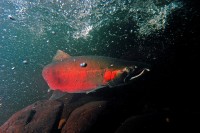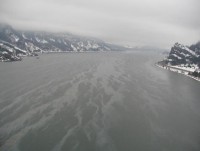Blog post by Christina Skirvin, Riverkeeper’s Program Administrator—
It's been a busy year here at Riverkeeper. On our last day of 2013, we reflect on some the year's major accomplishments, events, and milestones as well as share our immense appreciation to all of you who have donated, volunteered, and rallied alongside us in the fight for our right to clean water and to protect the mighty Columbia. Cheers to the New Year!
5. Victory over Dirty Stormwater Pollution

We set out to hold the largest county in southwest Washington accountable for its dirty stormwater pollution. And we won. In the final days of 2013, we celebrate a huge victory for clean water and salmon recovery. Clark County agreed to settle our long running lawsuit, comply with the law, and pay $3 million to an independent board to fund salmon recovery in local streams. This stands out as one of the largest penalties in a Clean Water Act citizen suit in Washington State history.
It all started back in 2009 when Clark County brokered a deal with state environmental regulators. Stormwater pollution is the leading cause of murky, unhealthy rivers in Washington State. Cities and counties are subject to special permits designed to get at the heart of the problem: urban sprawl. The County asked state regulators to approve weaker limits for reducing pollution from big box stores, subdivisions, and other sprawl that threatens fragile streams and rivers that once supported the most abundant salmon runs on Earth. The state regulators agreed.
What the County forgot was that there’s another sheriff in town: citizens and citizen groups. The Clean Water Act empowers citizens to sue the government—and polluters—when they violate the law. That’s exactly what Riverkeeper and our partners at the Rosemere Neighborhood Association and the Northwest Environmental Defense Center did. Led by a team of legal eagles from Earthjustice, we went on to win legal victories at the state pollution board, at the Court of Appeals, and in federal court.
That brings us to present day, the holiday season. In a resounding victory for communities that rely on eating healthy Columbia River fish and swimming in clean water, the County agreed to comply with the Clean Water Act and make payments totaling $3 million to the Lower Columbia Fish Recovery Board to be used to protect and restore struggling local streams and rivers.
4. Volunteers on the River
In 2013, Riverkeeper ran one of the largest volunteer monitoring programs in the West, and we are proud of our citizen scientists. Our volunteers monitored water quality, conducted habitat assessments, and completed river cleanups along 300 miles of the Columbia. We trained volunteers to use water quality probes, report pollution, and remove invasive species. Over 160 volunteers dedicated thousands of hours to provide important data and information to our staff. In addition to collecting data, we organized seven river cleanups, where 130 people removed over 5,700 pounds of trash from the river bank. We cleaned up parks, islands, and swimming beaches. Thanks to all our volunteers!
Riverkeeper expanded our popular Swim Guide smart phone app by adding 10 new beaches. Swim Guide helps people enjoy our river by providing water quality data for many swimming beaches. Because Oregon and Washington do not sample for E. coli at Columbia River swimming beaches, we collected samples at 39 beaches throughout the summer and provided real-time data via Swim Guide.
3. Coal and Oil: Sounding the Alarm
It’s been a wild ride in 2013. Not willing to be bullied by Big Coal, we redoubled our effort and took the offensive. Three of the six coal export terminals folded, including the large Kinder Morgan proposal on the Columbia! We exposed coal dust polluting the Columbia River, and we told a broad TV audience that new export terminals would make it much worse. Riverkeeper and allies filed a lawsuit to stop coal pollution into our river and Robert F. Kennedy, Jr. invited us onto his national radio show to tell the story. We dominated public hearings in Oregon and Washington where thousands of people stood together to say we can do better than dirty coal.
On September 17, we exceeded our goals in Longview, Washington, for the Millennium coal hearing by having 800 people stand up to oppose dirty coal. A Longview pastor, doctor, and transportation expert joined a Montana rancher to hold a press event objecting to coal. This “big tent” of broad opposition is getting bigger, and that is the reason we are winning.
We turned up the heat on new giant oil terminals too. When Tesoro Savage announced plans to build a 360,000-barrel-per-day oil terminal on the Columbia River (imagine 730 oil tankers per year on the Columbia), we jumped into action. Riverkeeper sued the Port of Vancouver for violating public meetings laws and failing to disclose the impacts of 1,400 oil trains per year on Vancouver and other communities on the rail route. Then, 400 people attended the first hearing of the state energy council who will vote on the project, and 31,000 people submitted written comments. The Columbian reported, “An hour and a half into the hearing, not a single person had spoken in favor of the proposal.” The paper quotes Brett VandenHeuvel saying, “This is a fight we can and will win, and it starts tonight.”
Riverkeeper also geared up to stop a large expansion of an oil and possibly coal terminal at Port Westward near Clatskanie, Oregon. The bad ideas to foul the Columbia came at a shocking pace in 2013, but Riverkeeper expanded our scope, built coalitions, and marched forward to protect the big river.
2. Clean Up the Dam Oil

After two years of investigating oil spills from Columbia River dams, Riverkeeper took action. We sued in federal court to reduce or eliminate the hundreds of spills each year, plus the unreported oil that leaks into the River on a daily basis. Oil, of course, harms fish and wildlife, and also may contain toxic chemicals. The Chief Joseph Dam, for example, spilled 1,500 gallons of oil into the Columbia that contained cancer-causing PCBs 14,000,000% above the state water quality limits.
This case is important, and will be watched across the nation, because most Columbia River dams do not currently have discharge permits. Nearly every other facility that discharges pollution into the River is regulated with limits in a permit, but so far the Army Corps of Engineers who operate the dams have refused to follow the Clean Water Act. The Army Corps’ sister agencies have failed to step in, so Riverkeeper is filling the gap. This case is drawing attention to the pervasive problem of oil discharge on the Columbia, and we look forward to creating an oil-free Columbia in our future.
1. Victory Over LNG

We pushed. We persevered. We prevailed. Clatsop County rejected Oregon LNG’s pipeline application! This is a victory that thousands of people have worked toward over the years. It’s a victory for salmon habitat, farmers threatened with pipelines, and our climate. Oregon LNG wants to place an unprecedented gas cooling plant and new marine terminal in the middle of a protected salmon nursery and export more gas than Oregon and Washington use combined. Fracking for gas and then super-cooling it for export is dirty and energy-intensive. We started 2013 off with a community tour of the proposed site. In the spring, the Supreme Court rejected Oregon LNG’s frivolous effort to block the Clatsop County vote. In the summer, we prepared legal arguments on why the County should reject LNG, and in the fall, Staff Attorney Lauren Goldberg presented to the County with 100 supporters in the room. Looking ahead, Oregon LNG will, of course, push forward in with legal challenges. But we are going to savor this as a major victory, and be ready to defend it in 2014.





